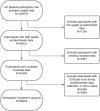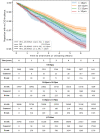Accelerometer-derived sleep onset timing and cardiovascular disease incidence: a UK Biobank cohort study
- PMID: 36713092
- PMCID: PMC9708010
- DOI: 10.1093/ehjdh/ztab088
Accelerometer-derived sleep onset timing and cardiovascular disease incidence: a UK Biobank cohort study
Abstract
Aims: Growing evidence suggests that poor sleep health is associated with cardiovascular risk. However, research in this area often relies upon recollection dependent questionnaires or diaries. Accelerometers provide an alternative tool for measuring sleep parameters objectively. This study examines the association between wrist-worn accelerometer-derived sleep onset timing and cardiovascular disease (CVD).
Methods and results: We derived sleep onset and waking up time from accelerometer data collected from 103 712 UK Biobank participants over a period of 7 days. From this, we examined the association between sleep onset timing and CVD incidence using a series of Cox proportional hazards models. A total of 3172 cases of CVD were reported during a mean follow-up period of 5.7 (±0.49) years. An age- and sex-controlled base analysis found that sleep onset time of 10:00 p.m.-10:59 p.m. was associated with the lowest CVD incidence. An additional model, controlling for sleep duration, sleep irregularity, and established CVD risk factors, did not attenuate this association, producing hazard ratios of 1.24 (95% confidence interval, 1.10-1.39; P < 0.005), 1.12 (1.01-1.25; P = 0.04), and 1.25 (1.02-1.52; P = 0.03) for sleep onset <10:00 p.m., 11:00 p.m.-11:59 p.m., and ≥12:00 a.m., respectively, compared to 10:00 p.m.-10:59 p.m. Importantly, sensitivity analyses revealed this association with increased CVD risk was stronger in females, with only sleep onset <10:00 p.m. significant for males.
Conclusions: Our findings suggest the possibility of a relationship between sleep onset timing and risk of developing CVD, particularly for women. We also demonstrate the potential utility of collecting information about sleep parameters via accelerometry-capable wearable devices, which may serve as novel cardiovascular risk indicators.
Keywords: Cardiovascular health; Circadian rhythm; Digital health; Sleep; UK Biobank.
© The Author(s) 2021. Published by Oxford University Press on behalf of the European Society of Cardiology.
Figures




References
-
- Brown JC, Gerhardt TE, Kwon E. Risk factors for coronary artery disease. In: StatPearls. Treasure Island (FL: ): StatPearls Publishing, ; 2021, https://pubmed.ncbi.nlm.nih.gov/32119297/ .
-
- Burgess E, Hassmén P, Welvaert M, Pumpa KL. Behavioural treatment strategies improve adherence to lifestyle intervention programmes in adults with obesity: a systematic review and meta-analysis. Clin Obes 2017;7:105–114. - PubMed
LinkOut - more resources
Full Text Sources
